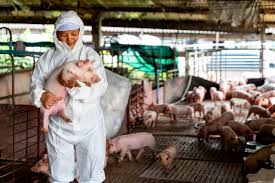African Swine Fever : Outbreak

The death toll of pigs following the outbreak of the African Swine Fever (ASF) disease in Mizoram since February has crossed 3,350, officials said recently.
- African Swine Fever (ASF) is a highly contagious viral disease of domestic and wild pigs, whose mortality rate can reach 100%.
- The ASF virus is a large, enveloped, double-stranded DNA virus that is the sole member of the genus Asfivirus within the family Asfarviridae.
- The clinical symptoms can look very much like those of classical swine fever: fever, weak pigs, lack of appetite, inflamed eye mucous membranes, red skin, (bloody) diarrhea and vomiting.
- ASF can be spread through:
- Direct contact with infected animals
- Indirect contact through the ingestion of products from infected animals, contact with contaminated clothing, vehicles, or equipment
- Bites by infectious soft ticks (where present)
- The ASF virus is able to survive for long periods in pork and pork meat products.
- It is endemic to sub-Saharan Africabut has spread to many other regions of the world, including Asia and Europe.
- In India, it was first confirmed in Arunachal Pradesh and Assam in February-March 2020.
- It is not a danger to human health.
- Meat or other products from pigs do not pose any food safety risks for humans. But it has devastating effects on pig populations and the farming economy.
- There is no cure or precaution available for the infection, and there is no approved vaccine.
- So, the only way to stop it from spreading is by culling the animals.




